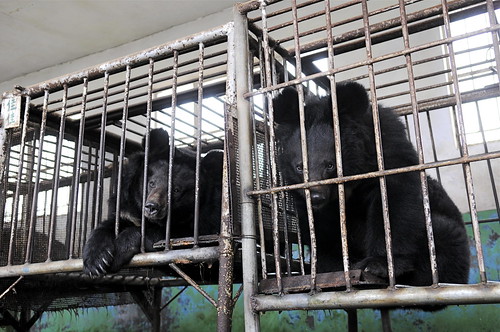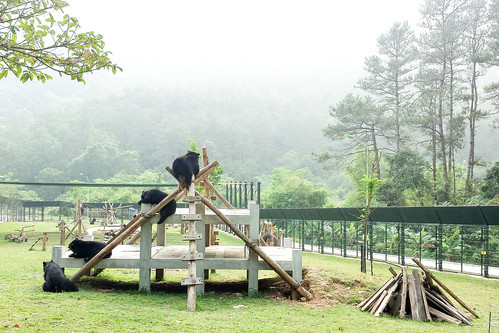BREAKING NEWS: Bear bile replacement breakthrough in China
06 August 2015
Hopes for an end to China’s bear bile farms have been boosted as Chinese manufacturer Kaibao Pharmaceuticals announced it has successfully synthesised a substitute for use in traditional medicine.
Animal welfare charity Animals Asia is calling it a step that could eventually save thousands of protected moon bears from farms.
In addition, with Kaibao’s project being backed by the Chinese government - Animals Asia believes it shows a clear intent at the highest levels to move away from the current extraction of bile from bears. This is also in accordance with statements by China’s President Xi Jinping to create an “eco civilisation” and a “green China”.
State-run media Wen Hui News this week ran a prominent article on the breakthrough acknowledging the current format of bear bile production as incompatible with animal protection and conservation.
Wen Hui News reported:
“In recent years, some bear species numbers have been reduced due to the bear bile trade, and the emergence of bear bile farming cannot serve as a sustainable solution to medicines made from animals. The medical field is faced with an ethical dilemma between animal protection and human needs."
"Kaibao Pharmaceuticals’ project, first announced last year, is heavily backed by state funds having attracted more than US$1.8 million in government funding."
Animals Asia founder and CEO, Jill Robinson MBE said:
“This project has the potential to drastically scale back China’s bear bile industry by providing an alternatively-sourced product that traditional medicinal practitioners and patients are happy to use.
“The fact that it is government-funded and sanctioned is hugely important. It shows that both businessmen and policy makers have realised there is no future in bear bile farming and are actively seeking ways to make it obsolete.”

While ursodeoxycholic acid, the active ingredient in bear bile, has long been artificially produced around the world for use in health care, the entire chemical make up of bear bile has never been successfully synthesised.
Kaibao Pharmaceuticals is currently the number one consumer of bear bile purchasing around 18 tonnes of powdered bile annually, approximately half of all purchased. The new artificial bear bile is created using poultry bile.
Over 10,000 bears are currently believed to be held on industrial scale bile farms around China. The animals are kept in highly unsuitable conditions with little regard for their welfare and endure regular bile extraction.
Hong Kong-based charity Animals Asia runs two bear sanctuaries for bears rescued from the bile industry. Since 1998, the NGO has rescued over 500 bears and offers them a lifetime of care in rescue centres in Chengdu, China, and Tam Dao, Vietnam. They have been campaigning to end bear bile farming for over 17 years.
Dave Neale, Animals Asia’s Animal Welfare Director said:
“For those of us who choose to live cruelty free lives – pharmaceuticals offer their own dilemma. Not just for our own use but also for the people we care for. The vast majority of mass-produced drugs contain either animal products or are tested on animals.
“The campaign to make medical and pharmaceuticals industries cruelty free is a global one. The pragmatic view in this case is it’s unlikely chickens will be killed specifically for these drugs as chicken bile is already available as a byproduct of meat processing – while its introduction is likely to help end the suffering of thousands of bears.
"With that in mind we welcome this move by Kaibao and the Chinese government as a step in the right direction. Clearly we also believe that all industries worldwide utilising animals, ultimately have to go further. In that respect pharmaceuticals join a long list of products including food, cosmetics and clothing – but what we are seeing here is undoubtedly progress.
"While it would make little economic sense to breed chickens specifically for bile – should that ever prove to be the case then obviously our position would change."
BACK







 Healing the hidden wounds
Healing the hidden wounds
 Early summer awakening at the China Bear Rescue Centre
Early summer awakening at the China Bear Rescue Centre
 5 reasons the dog meat trade must end
5 reasons the dog meat trade must end